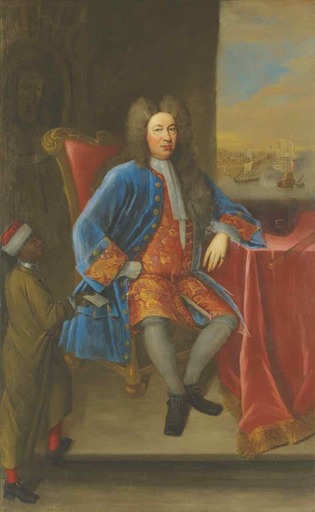 loading
loading
Light & VerityA renaming question very close to homeElihu Yale’s role in the slave trade inspires an ironic campaign.  Yale University Art GalleryA portrait of Elihu Yale in the university’s collection includes a shackled, dark-skinned servant. There is no documentary evidence that Yale himself owned enslaved people, but he oversaw the trade in slaves as an official in India. View full imageAmong so many other things, 2020 has been a year for reassessing our nation’s symbols. That includes the removal of Confederate statues, the renaming of Washington’s professional football team, and countless more actions and discussions on subjects ranging from Robert E. Lee to Eskimo Pies. In June, Princeton removed President Woodrow Wilson’s name from both a residential college and the public policy school because of his “racist thinking and policies.” It started on the website 4chan on June 10. Arguing that Elihu Yale was “a prominent slave trader,” an anonymous poster proposed a campaign to compel Yale to change its name as a way of “cheapening the brand” of an institution that “undoubtedly bears some culpability in the unrest we see today.” The mantle was picked up by conservative commentators such as Ann Coulter and Roger Kimball ’82MPhil. Kimball’s essay was reprinted as a full-page ad in the New York Times, paid for by the Center for American Greatness, on whose website it had first appeared. It was, in other words, a sustained and committed campaign to expose the university that had renamed Calhoun College to charges of hypocrisy. Yale’s administration didn’t take the bait; President Peter Salovey ’86PhD told the Yale Daily News that the university is not considering changing its name. Despite the movement’s ironic origin, it provoked a sympathetic response from some on the left. On the website of his magazine Current Affairs, Nathan Robinson ’14JD wrote that although “a political fight in favor of Yale changing its name . . . is probably not worth having, . . . it’s also not a name worth defending.” In the New Haven Independent, Law School visiting lecturer Sean O’Brien went further, arguing that the university must rename itself. There is no evidence that Elihu Yale (1649–1721) ever owned enslaved people in his own name. But as governor and president of the East India Company’s settlement in Madras, he oversaw an operation that traded in products of many kinds, and also in human slaves. “The evidence is overwhelming; it’s right there in front of you in black and white,” says Joseph Yannielli ’15PhD, a lecturer at Aston University in the United Kingdom; as a Yale graduate student, he wrote a paper about Elihu Yale’s links to slavery. “He wasn’t going around writing pro-slavery tracts or speaking out in favor of slavery like John C. Calhoun [Class of 1804], but he was part of the Indian Ocean slave trade and he profited from it.” Some of Yale’s biographers, such as Machu Picchu explorer Hiram Bingham III, Class of 1898, underplayed his connection to slavery. Bingham pointed out that Yale issued an order prohibiting the transfer of slaves from Madras when he was governor there in 1688. But Yannielli says that it was a tactical response to pressure from the local Mughal government, not a decision made on principle: “A year later, he is ordering the transport of slaves from Madagascar to Indonesia.” The university’s own principles for renaming, developed during the controversy over Calhoun College, encourage the consideration of several questions, including whether the objectionable part of a namesake’s life is “a principal legacy” of that person. What is Elihu Yale’s principal legacy? One answer is simply that, in exchange for a gift of some 562 pounds more than 300 years ago, he supplied the name of a now renowned university. Arguing against the name change in the Atlantic, political science lecturer Graeme Wood wrote that the university’s name “has long been divorced in meaning from the life of Elihu Yale. No one was venerating him; no one was trying to live up to his ideals. The name Yale does not belong to Elihu, but to the university, with its faults and virtues, not his.”
|
|
1 comment
-

Jerome B. Shapiro 70 Ph.D., 1:00pm September 15 2020 |  Flag as inappropriate
Flag as inappropriate
The comment period has expired.I am certainly glad that calmer heads prevailed, and a distinction could be be made between Calhoun College and Elihu Yale.